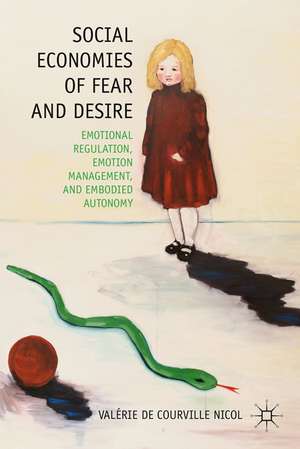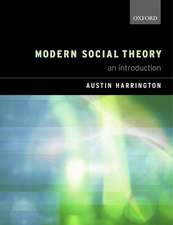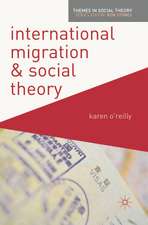Social Economies of Fear and Desire: Emotional Regulation, Emotion Management, and Embodied Autonomy
Autor V. Nicolen Limba Engleză Hardback – 7 dec 2011
| Toate formatele și edițiile | Preț | Express |
|---|---|---|
| Paperback (1) | 383.93 lei 6-8 săpt. | |
| Palgrave Macmillan US – 7 dec 2011 | 383.93 lei 6-8 săpt. | |
| Hardback (1) | 389.70 lei 6-8 săpt. | |
| Palgrave Macmillan US – 7 dec 2011 | 389.70 lei 6-8 săpt. |
Preț: 389.70 lei
Nou
Puncte Express: 585
Preț estimativ în valută:
74.57€ • 77.86$ • 61.72£
74.57€ • 77.86$ • 61.72£
Carte tipărită la comandă
Livrare economică 04-18 aprilie
Preluare comenzi: 021 569.72.76
Specificații
ISBN-13: 9780230338685
ISBN-10: 0230338682
Pagini: 261
Ilustrații: VIII, 261 p.
Dimensiuni: 140 x 216 x 20 mm
Greutate: 0.45 kg
Ediția:2011
Editura: Palgrave Macmillan US
Colecția Palgrave Macmillan
Locul publicării:New York, United States
ISBN-10: 0230338682
Pagini: 261
Ilustrații: VIII, 261 p.
Dimensiuni: 140 x 216 x 20 mm
Greutate: 0.45 kg
Ediția:2011
Editura: Palgrave Macmillan US
Colecția Palgrave Macmillan
Locul publicării:New York, United States
Cuprins
Introduction: Analyzing emotional selves PART I: EMBODIED IN/CAPACITY THEORY Chapter 1: Analyzing fear and desire Relational threat and relational promise: the anticipation of pain and pleasure Fear, desire, and the hope response Emotional norms: fear and desire forms in relational context Emotional norm pairs Chapter 2: Analyzing emotional interaction Affective, agential, and symbolic attunement Three modalities of fear and desire: panic/excitement, anxiety/interest, and distress/relief Fearing fear and desiring desire: the emergence of internal (moral) conflict Emotional blending and emotional differentiation Chapter 3: Analyzing autonomous selves Biological, subjective, and moral autonomy: unindividuated, self-involved, and other-directed kinds Conceptualizing embodied autonomy Subjective, moral, and social emotional experiences and emotions PART II: EMOTIONAL ECONOMIES Chapter 4: Analyzing moral danger and self-fear From subjective to moral autonomy: the process of responsibilization Explanations for the rise in experiences of self-fear Forms of self-control and forms of moral suffering On physical coercion and moral responsibility Chapter 5: Analyzing social interaction Emotional regulation, hedonic power, and emotion management Social dis/approval: shame/pride and personal insecurity/self-esteem as moral experiences of social danger and social security Moral actions of social conformity Chapter 6: Analyzing emotion management Interacting with The Managed Heart Lying, acting, and emotion management Emotives, modalities of fear and desire, and moral self-control Chapter 7: Analyzing emotional campaigns Master emotional norm pairs: from self-discipline to self-realization Campaigns of fear, campaigns of desire Contemporary emotion management efforts Chapter 8: Analyzing self-discipline and self-realization From the fear of desire to the fear of fear Culture of fear critics Situation assimilation and the mass media
Recenzii
'Valérie de Courville Nicol's work makes a vital contribution to an emerging literature on emotion. Through her explication of power, self, and emotion, de Courville creates an innovative, empirically grounded, and interdisciplinary theoretical approach to the study of the self in society. Her groundbreaking work sheds light on a wide range of contemporary issues, from securitization to the self-help movement. Through the lens of emotion, de Courville's work represents a major breakthrough in one of the most fundamental and unresolved debates in social science: how and when do people exercise agency?' Lori G. Beaman, Professor of Classics and Religious Studies, University of Ottawa
'This is a sharp, analytically rigorous book that places suffering at the centre of emotional experience. De Courville skillfully shows how fear and desire shape moral life, and in so doing, she gives us a useful theory of embodied in/capacity that is an alternative to dominant approaches to understanding how emotions infuse social action.' Melanie White, Senior Lecturer in Social Theory, University of New South Wales
'De Courville propels the expanding interest in the sociology of emotions. She does so in a way that argues that the modern emotional experience is not focused only on fear and anxiety, but that today pleasure and excitement also shape our emotional experience and responsibilizes our conduct.' Alan Hunt, professor of Sociology and Law, CarletonUniversity
'This book destabilizes the dualisms (e.g. nature versus culture, fight versus flight) that have limited the sociology of emotions for so long. The innovative concepts and the critical focus on power and morality will appeal to all social and cultural researchers interested in emotions.' Kevin Walby, Assistant Professor of Sociology, University of Victoria; Co-editor of Emotions Matter
'This is a sharp, analytically rigorous book that places suffering at the centre of emotional experience. De Courville skillfully shows how fear and desire shape moral life, and in so doing, she gives us a useful theory of embodied in/capacity that is an alternative to dominant approaches to understanding how emotions infuse social action.' Melanie White, Senior Lecturer in Social Theory, University of New South Wales
'De Courville propels the expanding interest in the sociology of emotions. She does so in a way that argues that the modern emotional experience is not focused only on fear and anxiety, but that today pleasure and excitement also shape our emotional experience and responsibilizes our conduct.' Alan Hunt, professor of Sociology and Law, CarletonUniversity
'This book destabilizes the dualisms (e.g. nature versus culture, fight versus flight) that have limited the sociology of emotions for so long. The innovative concepts and the critical focus on power and morality will appeal to all social and cultural researchers interested in emotions.' Kevin Walby, Assistant Professor of Sociology, University of Victoria; Co-editor of Emotions Matter
Notă biografică
VALÉRIE DE COURVILLE NICOL Associate Professor in the Department of Sociology & Anthropology at Concordia University in Montreal, Quebec, Canada.













